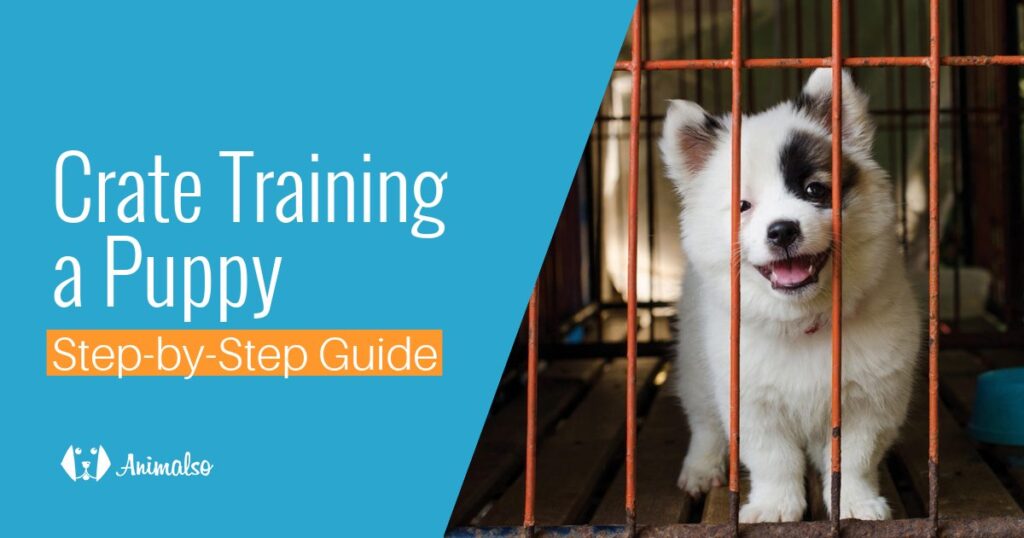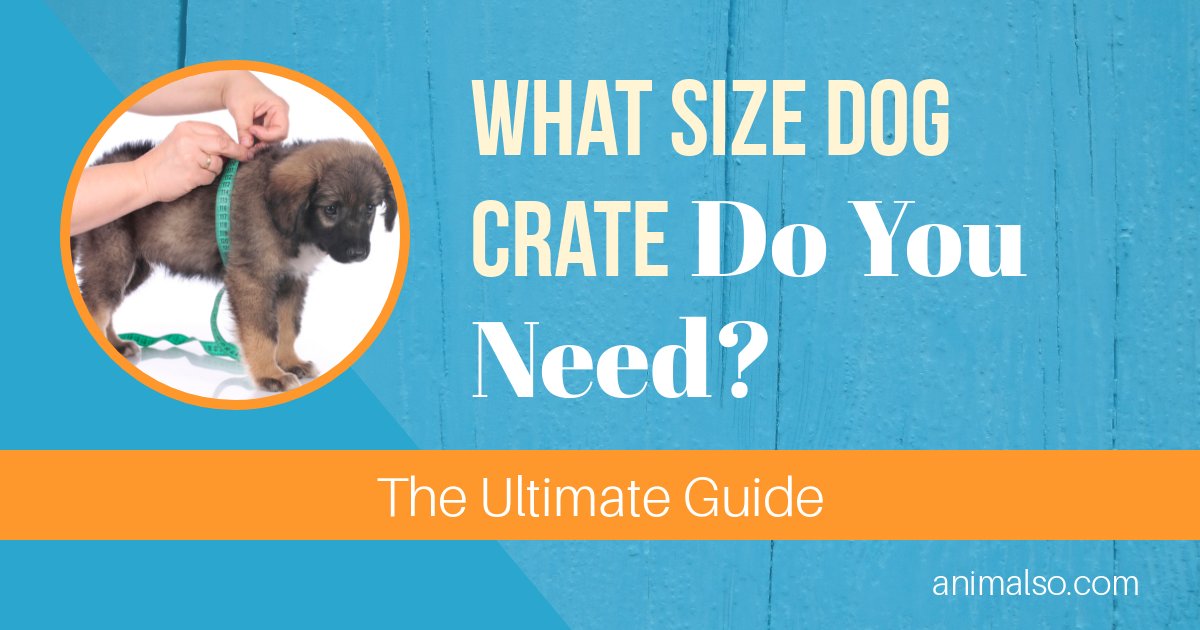
If you’re not sure what size dog crate to buy for your dog, you’ve come to the right place. This ultimate dog crate guide will not only help you to find the right size but also the right style to suit you and your dog’s needs.
Do you need a crate for puppy training? Or perhaps you want a heavy duty one that your dog can’t destroy? There are many different dog crate designs on the market, so you’re bound to find one that suits your needs.
I’ll tell all the factors you need to consider when you’re choosing a crate, how to measure your pooch, plus we’ll look at the main styles of crate available and the pros and cons for each.
Stick with us!
How To Choose The Right Dog Crate?
Crates come in a variety of sizes, styles, and materials. Choosing the right crate depends on various factors, including:
- The size of your dog
- The age of your dog (if she is a puppy, you may want to get a wire crate and use a divider)
- If your dog likes a den-like atmosphere or an open crate with visibility
- If she is destructive or an escape artist
- The climate (some are better ventilated/insulated than others)
- The style you desire for your home
- Whether you need it for travel (some are specifically designed for easy transportation and airline travel)
If your head is spinning after reading all that, don’t worry!
Later on, we will give you a breakdown of all the different types of crates along with which dogs (and people!) it suits best.
How Big Should a Dog Crate Be?
It is important to get the size of your dog’s crate right. It shouldn’t be too cramped, but it shouldn’t offer too much space, either.
Your dog should be able to turn around easily and sit up without hitting her head on the top. She should also be able to stretch out her legs when lying on her side. Dogs need leg room, too!
Dog owners often buy crates that are too large to give their dog lots of extra space, but this actually detracts from the crate’s usefulness as a training tool. For example, crates can be used for house training, but if your dog has too much room in her crate, she could end up using one corner as a bathroom.
What’s more, crates can give your pooch a feeling of security, which your dog won’t be feeling if she has lots of empty space around her.
So, what size dog crate do you need?
How To Measure An Adult Dog For A Crate
So, let’s talk about measurements for a fully-grown dog.
If she is an adult, you will need to measure her length and height. (I suggest having some treats to hand!) Measuring the width of your dog is not necessary, as once you have the right height and length, the width will be proportional.
To make things easier for you, you can have your dog stand against a wall (preferably in a corner, with her bottom against the wall). This way, you can mark the measurements and get out the measuring tape after. To make the marks, be sure to use something that rubs off after, like chalk.
Length
To accurately measure the length of your dog, get her standing on all four paws and measure from the tip of her nose to the base of her tail. You do not need to include the entire length of your dog’s tail, or the crate will be too big.

For very thick, hard tails, you can measure a little of her tail if you wish – this is because when she wags, it will hit against the crate.
Next, add 2 inches (5 cm) for smaller dogs, and 4 inches (10 cm) for larger dogs to allow her ample moving room, and you’ve got the minimum length* for your dog’s crate.
Height
Now, get those treats out and tell your dog to sit. Measure her in this upright position from the floor to the tallest point of their head (if your dog’s ears are erect, measure up to to the tip of the ears!)

Again, add 2 – 4 inches, and you’ve got the minimum height* for your crate.
*These measurements will give you the minimum crate size. If you get a crate that is a few inches bigger, it shouldn’t matter. More than that, however, could result in a crate that is too large for your dog, and, as mentioned above, will not make a good crate training environment.
What Size Crate Should You Get For A Puppy?
If your budget allows it and you’d prefer to buy different-sized crates for your dog throughout their growing period, you can use the same method as above.
But let’s face it; pups grow fast so that money won’t last! So, if you choose to do this, I would advise you not to spend too much money on your first purchases. Once she reaches adult size, you can opt for more expensive, stylish crates that she can enjoy for longer.
Below is another handy money-saving tip I’d like to suggest.
Tip: Save Money By Buying A Resizable Crate
It’s highly likely that your dog’s size as a puppy will be very different to her full-grown adult size, meaning she will need a far smaller crate during puppyhood. And what about all the stages in between?
Clearly, it would take a lot of hassle and cash to keep upgrading crates as your puppy grows. Instead, a good idea is to get one to accommodate your dog’s adult size and buy a divider to reduce the size to suit your pup.

A divider is a removable wire or wooden panel you insert into the crate to adjust the available size.
So, as your little one grows, you can keep altering the position of the divider to give her the space she needs. That way, your dog will get all the benefits of a well-fitted crate from puppyhood to adulthood.
Dog Crate Sizes Chart for All Popular Breeds
This is a dog crate size guide for common dog breeds, designed to help you choose the right size crate for your pet. But first, let me tell you two things:
- I have provided a weight and height bracket for each section, so you have a rough idea of which category your dog is likely to fall under.
- Your dog’s gender – as well as the possibility of mixed ancestry – affects her size. So, bear in mind that he or she may need a bigger or smaller crate than what is listed here.
18″ – 22″ Dog Crate Sizes for Extra Small Dog Breeds
18” – 22” (45 – 56 cm) dog crates are the best size for the following toy breeds weighing between 1-10 lbs and ranging from about 6”-12” in height:
- Affenpinscher
- Bichon Frise
- Boston Terrier
- Brussels Griffon
- Chihuahua
- Jack Russell Terrier
- Japanese Chin
- Maltese
- Miniature Dachshund
- Papillon
- Pomeranian
- Pug
- Russkiy Toy
- Shih Tzu
- Toy Fox Terrier
- Yorkshire Terrier
XS crate dimensions include:
- 18″ L x 12″ W x 14″ H
- 18.5″ L x 12.5″ W x 14.5″ H
- 19″ L x 12″ W x 15″ H
- 22″ L x 13″ W x 16″ H
Our #1 Recommended Crate for Extra Small Breeds
18″ Single Door Folding Metal Dog iCrate by Midwest
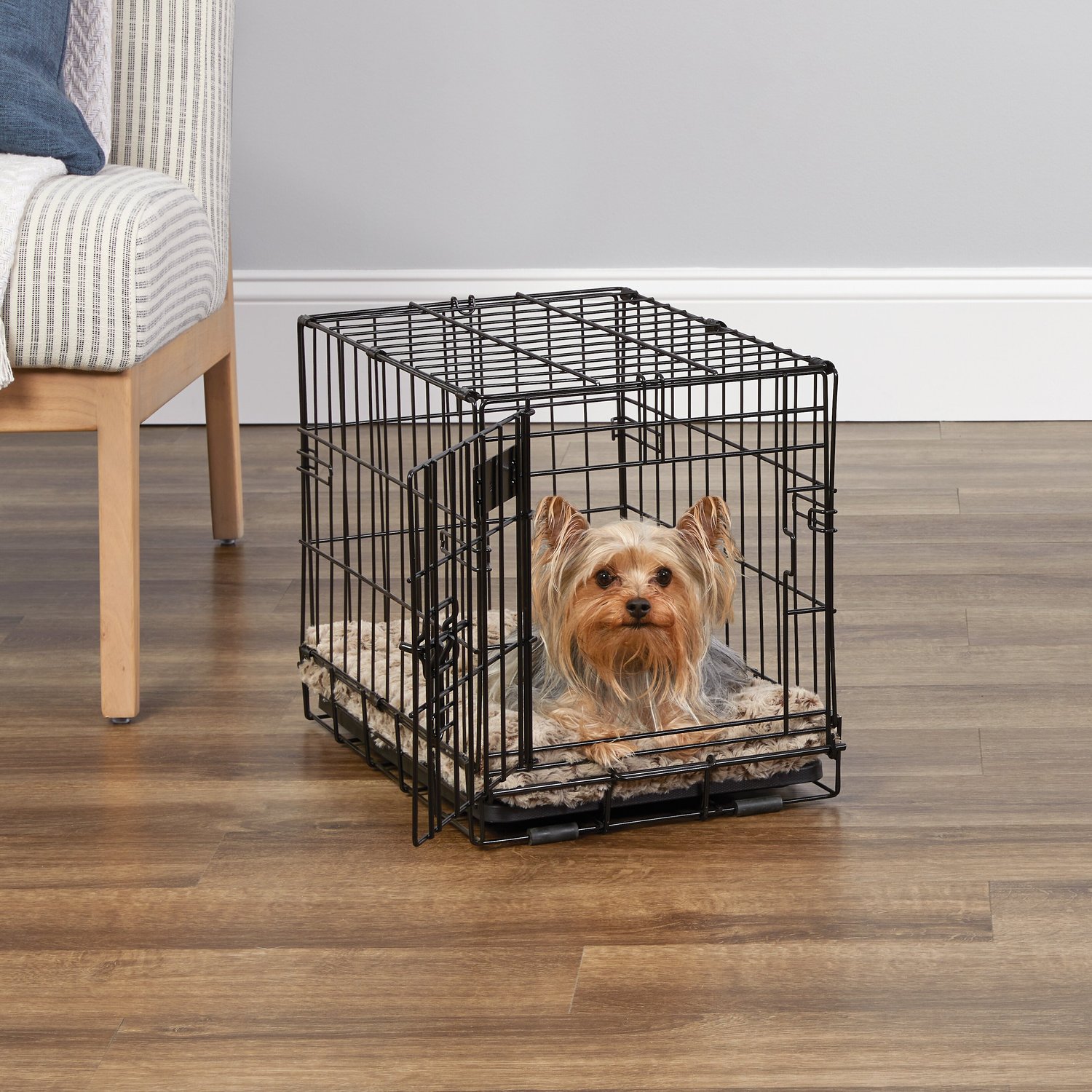
18″ L x 12″ W x 14″ H
22″ Single Door Folding Metal Dog iCrate by Midwest

22″ L x 13″ W x 16″ H
>>For our review of the top 15 best crates for extra small dogs and puppies, please click here.
24″ Dog Crate Sizes for Small Dog Breeds
24” (61cm) dog crates are the best size for the following small breeds weighing between 11-25 lbs and ranging from around 13”-17” in height.
- Affenpinscher
- Australian Silky Terrier
- Bichon Frise
- Border Terrier
- Boston Terrier
- Cairn Terrier
- Cavalier King Charles Spaniel
- Chinese Crested
- Dachshund
- Fox Terrier
- French Bulldog
- Havanese
- Jack Russell Terrier
- Italian Greyhound
- Lhasa Apso
- Maltese
- Miniature Pinscher
- Miniature Poodle
- Miniature Schnauzer
- Norfolk Terrier
- Norwich Terrier
- Parson Russell Terrier
- Pekingese
- Scottish Terrier
- Shih Tzu
- Skye Terrier
- Tibetan Spaniel
- Welsh Terrier
- West Highland White Terrier
- Yorkshire Terrier
Small crate dimensions include:
- 24″ L x 18″ W x 19″ H
- 24″ L x 17″ W x 20″ H
- 24″ L X 18″ W X 21″ H
- 24.5” L x 17.5” W x 19.5” H
- 24.5” L x 18” W x 19.5” H
- 25” L x 18.5” x 21” H
Our #1 Recommended Crate for Small Breeds
24″ Single Door Folding Metal Dog iCrate by Midwest
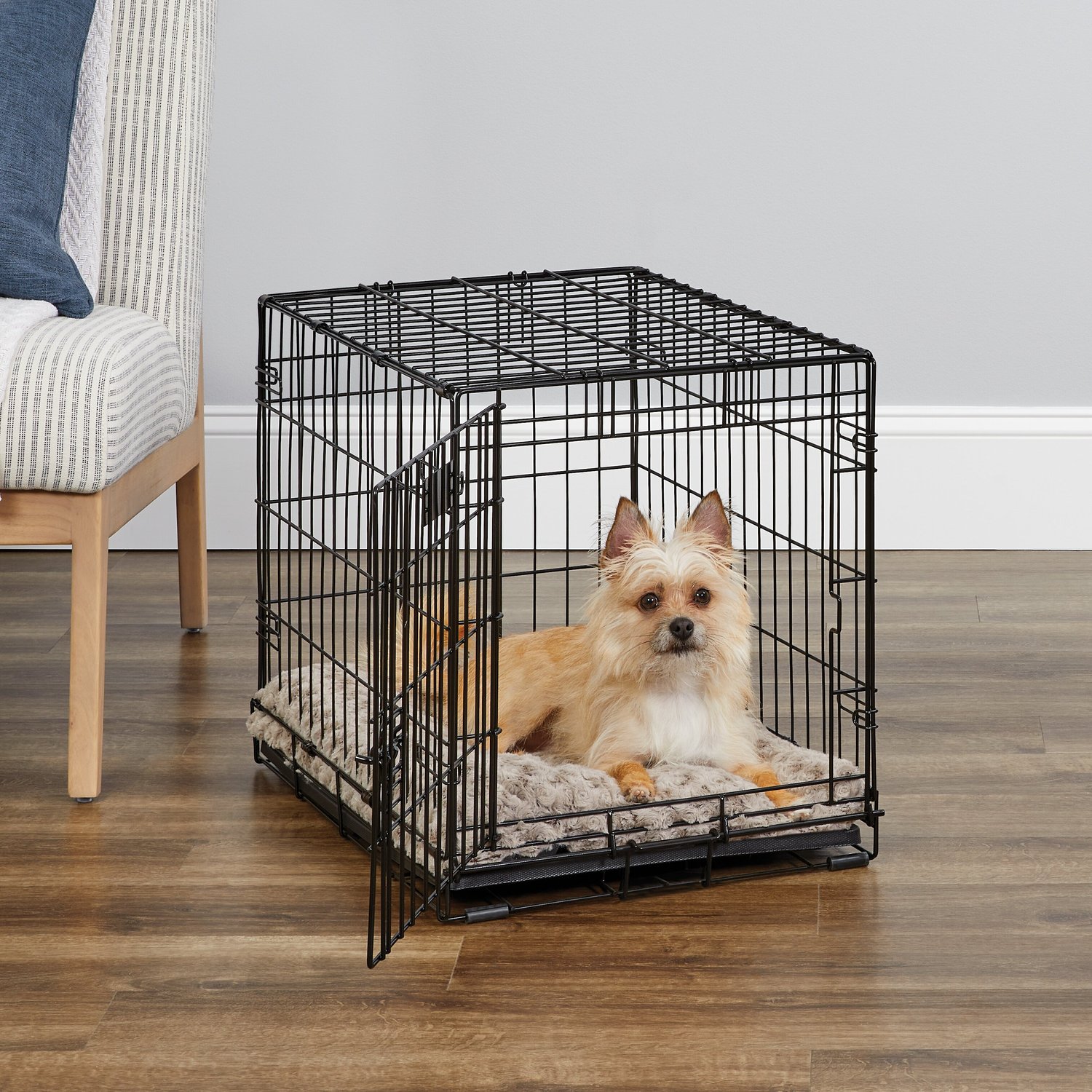
24″ L x 18″ W x 19″ H
Best Features:
- Durable, folding metal crate
- Easy to assemble w/out tools
- Free removable leak-proof plastic pan
- Free divider to adjust size
- Heavy duty locks
- Available in Black, Blue and Pink colors
>>For our review of the top 15 best crates for small dogs and puppies, please click here.
30″ Dog Crate Sizes for Medium Dog Breeds
30” (76cm) dog crates are the best size for the following medium-sized breeds weighing between 26-40 lbs and measuring about 18”-19” in height.
- American Pit Bull Terrier
- American Staffordshire Terrier
- American Water Spaniel
- Basenji
- Bedlington Terrier
- Cardigan Welsh Corgi
- Clumber Spaniel
- Cocker Spaniel
- Dachshund
- French Bulldog
- German Pinscher
- Kerry Blue Terrier
- Miniature Schnauzer
- Shetland Sheepdog
- Soft-Coated Wheaten Terrier
- Staffordshire Bull Terrier
- Tibetan Terrier
- Welsh Corgi
- Welsh Terrier
Medium crate dimensions include:
- 30″ L x 19″ W x 21″ H
- 30″ L x 19″ W x 22″ H
- 30″ L x 21″ W x 24″ H
- 30.5” L x 19.25” W x 21.5” H
- 30.75″ L x 19.75″ W x 21.5″ H
- 30.25” L x 19.25” W x 20.5” H
- 31” L x 21.5” W x 24” H
Our #1 Recommended Crate for Medium Breeds
30″ Single Door Folding Metal Dog iCrate by Midwest
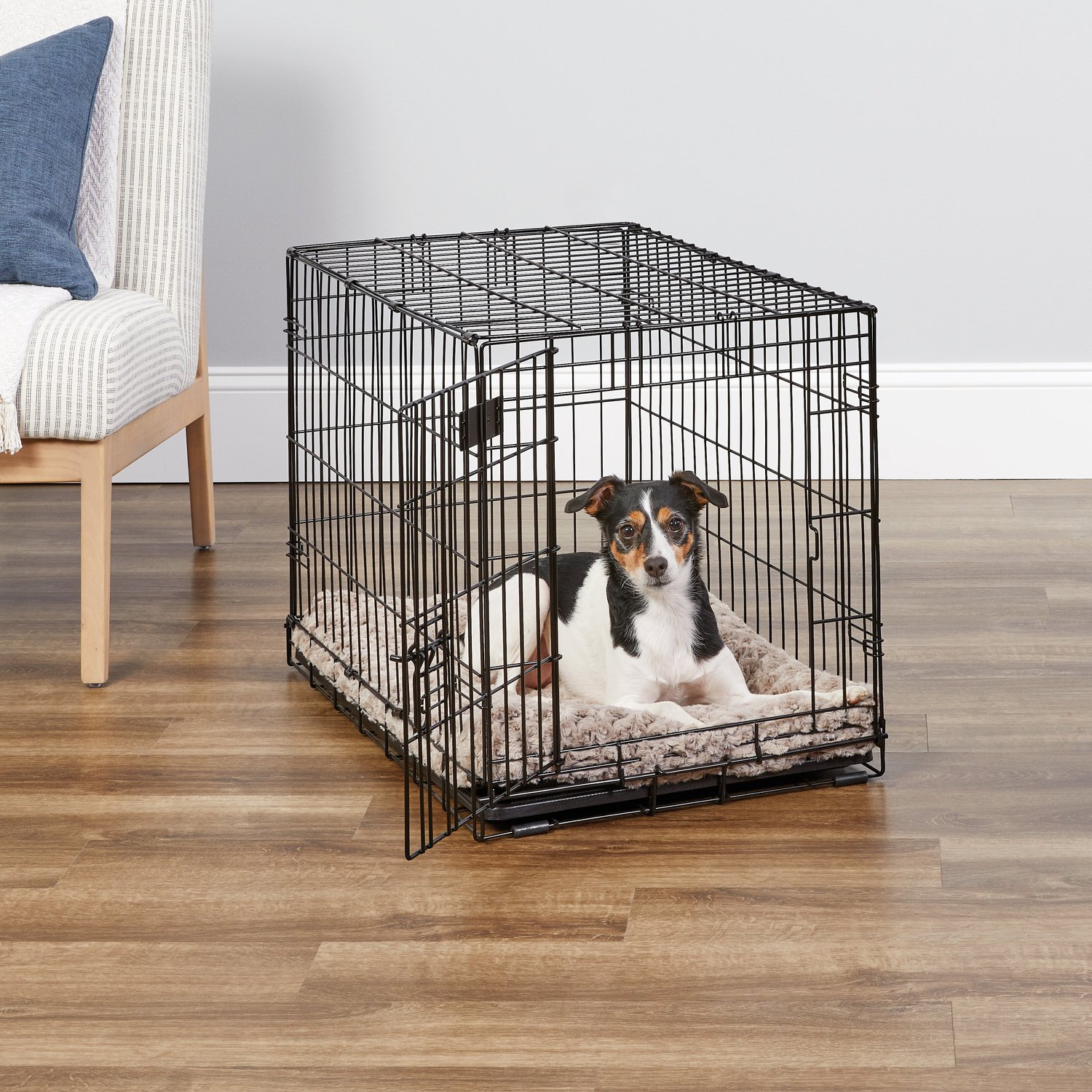
30″ L x 19″ W x 21″ H
Best Features:
- Durable, folding metal crate
- Easy to assemble w/out tools
- Free removable leak-proof plastic pan
- Free divider to adjust size
- Heavy duty locks
- Single door or Double door
36″ Dog Crate Sizes for Intermediate Dog Breeds
36” (91cm) dog crates are the best size for the following intermediate-sized breeds weighing between 41-70 lbs and ranging from around 20”-22” in height:
- Alaskan Husky
- American Eskimo
- Australian Cattle Dog
- Basset Hound
- Beagle
- Belgian Tervuren
- Border Collie
- Brittany Spaniel
- Bulldog
- Bull Terrier
- Chinese Shar-Pei
- Chow-Chow
- Clumber Spaniel
- Cocker Spaniel
- English Setter
- English Springer Spaniel
- Finnish Spitz
- Harrier
- Keeshond
- Norwegian Elkhound
- Portuguese Water Dog
- Shetland Sheepdog
- Siberian Husky
- Standard Schnauzer
- Whippet
Intermediate crate dimensions include:
- 36″ L x 23″ W x 25″ H
- 36″ L x 23″ W x 26″ H
- 36″ L x 24″ W x 27″ H
- 36” L x 21” W x 26” H
- 36.75” L x 22.75” W x 24.75” H
- 37” L x 24.5” W x 28” H
- 37.25” L x 23” W x 24.75” H
Our #1 Recommended Crate for Intermediate Breeds
36″ Double Door Folding Metal Dog iCrate by Midwest
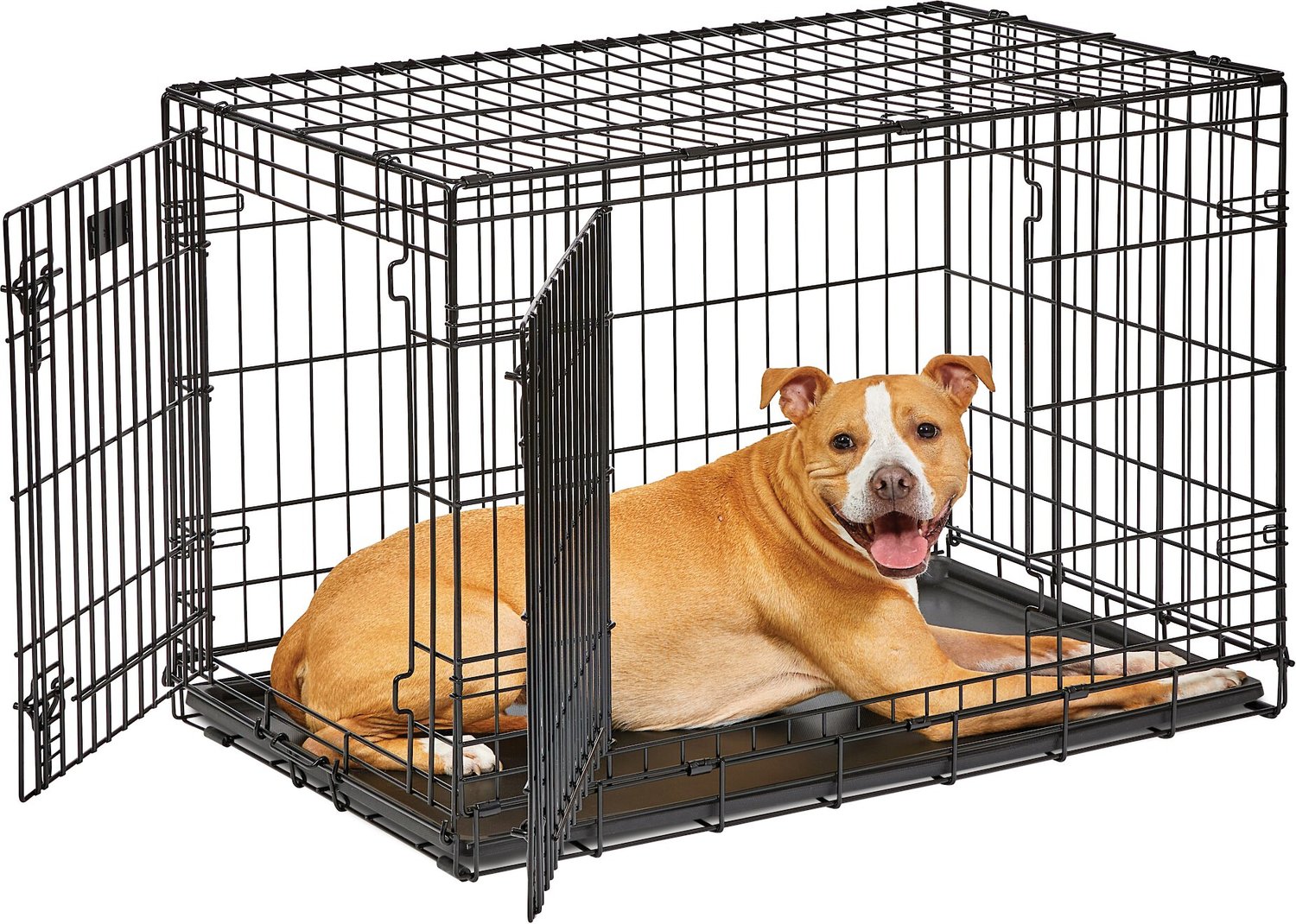
36″ L x 23″ W x 25″ H
Best Features:
- Durable, folding metal crate
- Easy to assemble w/out tools
- Free removable leak-proof plastic pan
- Free divider to adjust size
- Heavy duty locks
- Single door or Double door
42″ Dog Crate Sizes for Large Dog Breeds
42” (107cm) dog crates are the best size for the following large breeds weighing between 71-90 lbs and ranging from about 23” – 26” in height:
- Airedale Terrier
- American Bulldog
- Australian Shepherd
- Bearded Collie
- Belgian Malinois
- Belgian Sheepdog
- Belgian Tervuren
- Border Collie
- Boxer
- Briard
- Chesapeake Bay Retriever
- Dalmatian
- English Setter
- German Shepherd
- Golden Retriever
- Gordon Setter
- Ibizan Hound
- Irish Setter
- Irish Water Spaniel
- Labrador Retriever
- Rhodesian/Thai Ridgeback
- Saluki
- Samoyed
- Poodle (Standard)
- Vizsla
Large crate dimensions include:
- 42″ L x 28″ W x 30″ H
- 42″ L x 28″ W x 31″ H
- 42″ L x 29″ W x 31″ H
- 42” L x 21” W x 30” H
- 43″ L x 28.5″ W x 30.25″ H
- 43” L x 28.25” W x 31.5”H
- 43.25” L x 29.25” W x 30.5” H
- 43.25” L x 28.25” W x 30.25” H
Our #1 Recommended Crate for Large Breeds
42″ Single Door Folding Metal Dog iCrate by Midwest
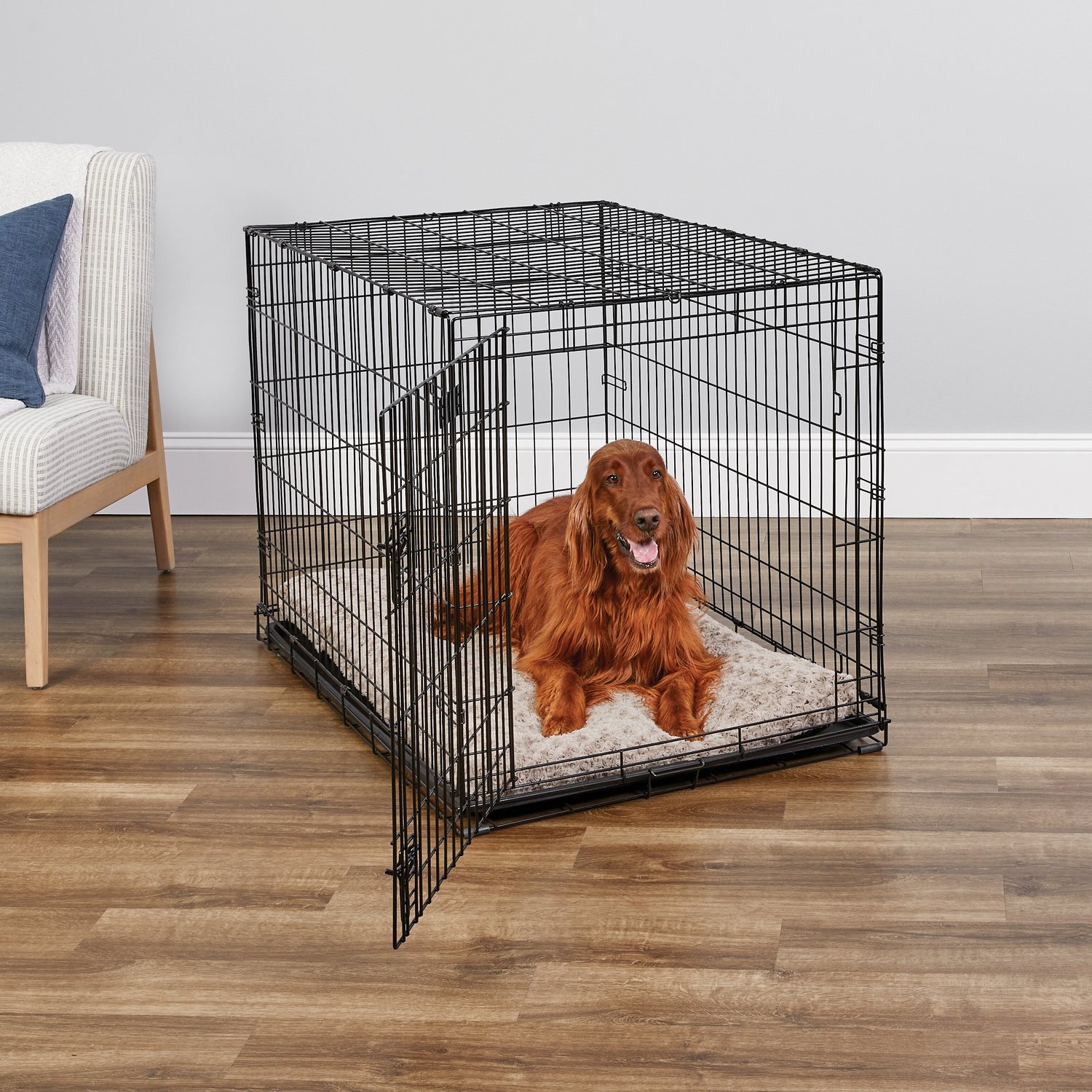
42″ L x 30″ W x 28″ H
Best Features:
- Durable, folding metal crate
- Easy to assemble w/out tools
- Free removable leak-proof plastic pan
- Free divider to adjust size
- Heavy duty locks
- Single door or Double door
>>For our review of the top 30 best crates for Large dogs, please click here.
48″ Dog Crate Sizes for Extra Large Dog Breeds
48” (122cm) dog crates are the best size for the following XL breeds weighing between 91 – 110 lbs and ranging from around 26” – 28” in height:
- Afghan Hound
- Akita
- Alaskan Malamute
- Bernese Mountain Dog
- Bloodhound
- Bouvier Des Flandres
- Briard
- Bullmastiff
- Chinook
- Doberman Pinscher
- Giant Schnauzer
- Greyhound
- Komondor
- Kuvasz
- Old English Sheepdog
- Otterhound
- Pointer
- Rottweiler
- Samoyed
- Tervueren
- Weimaraner
XL crate dimensions include:
- 48″ L x 29″ W x 32” H
- 48” L x 30” W x 32” H
- 48” L x 30” W x 33” H
- 48.75″ L x 30.25″ W x 32.25″ H
- 49.75″ L x 30.25″ W x 32.25″ H
- 48.75″ L x 30.875″ W x 32.25″ H
- 49″ L x 30″ W x 35″ H
Our #1 Recommended Crate for Extra Large Breeds
48″ Single Door Folding Metal Dog iCrate by Midwest
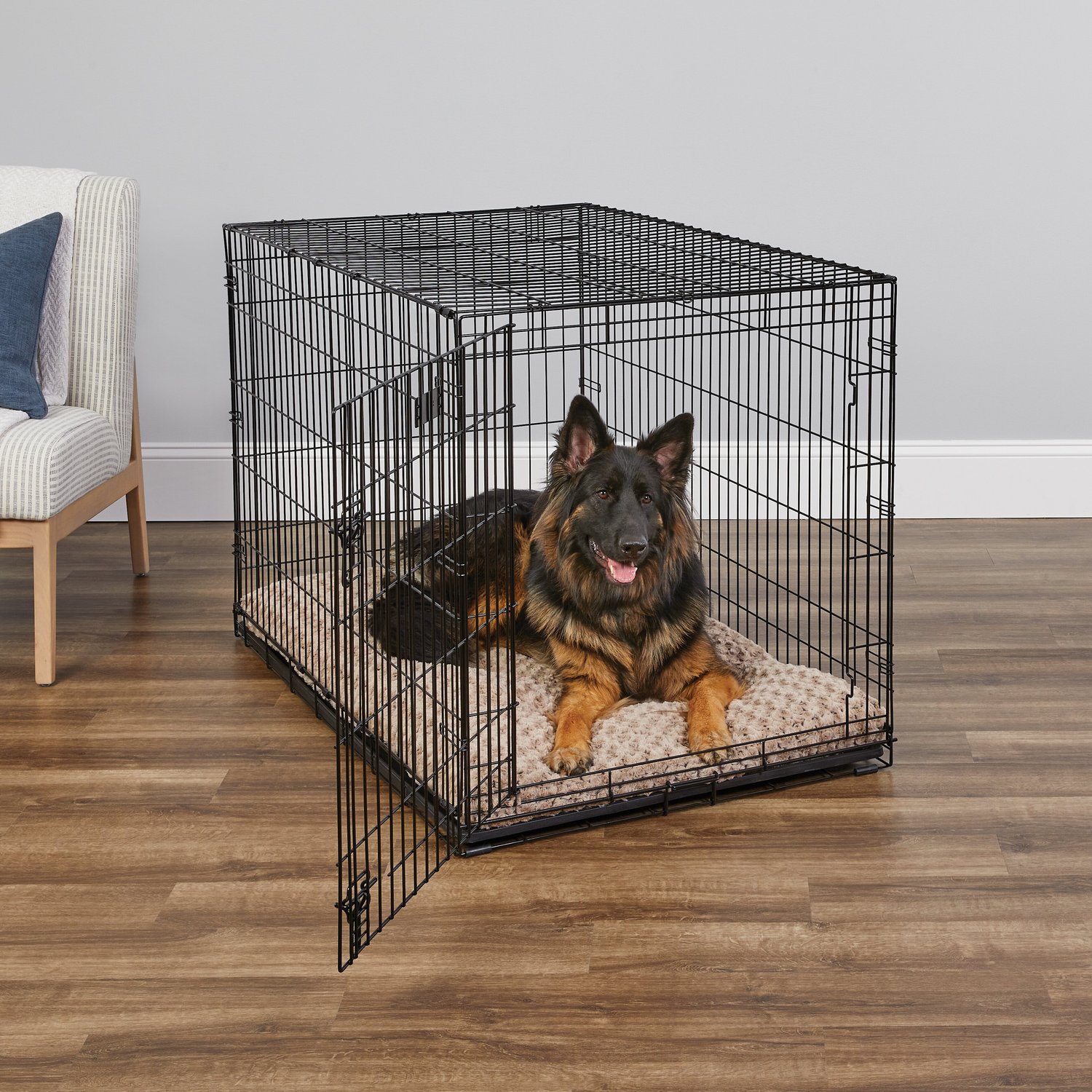
48″ L x 30″ W x 33″ H
Best Features:
- Durable, folding metal crate
- Easy to assemble w/out tools
- Free removable leak-proof plastic pan
- Free divider to adjust size
- Heavy duty locks
- Single door or Double door
>>For our review of the top 30 best crates for Large & Extra Large dogs, please click here.
54″ Dog Crate Sizes for XXL Giant Dog Breeds
54” (137cm) dog crates are the best size for the following giant breeds weighing over 110 lbs and ranging from somewhere between 29” – 40” in height:
- Anatolian Shepherd
- Borzoi
- Dogue De Bordeaux
- Great Dane
- Great Pyrenees
- Irish Wolfhound
- Leonberger
- Mastiff
- Neapolitan Mastiff
- Newfoundland
- Scottish Deerhound
- St. Bernard
XXL crate dimensions include:
- 54” L x 35” W x 45” H
- 54″ L x 37″ W x 45″ H
Our #1 Recommended Crate for Extra Extra Large Breeds
54″ Midwest Solution Series “Ginormus” Double Door Dog Crate
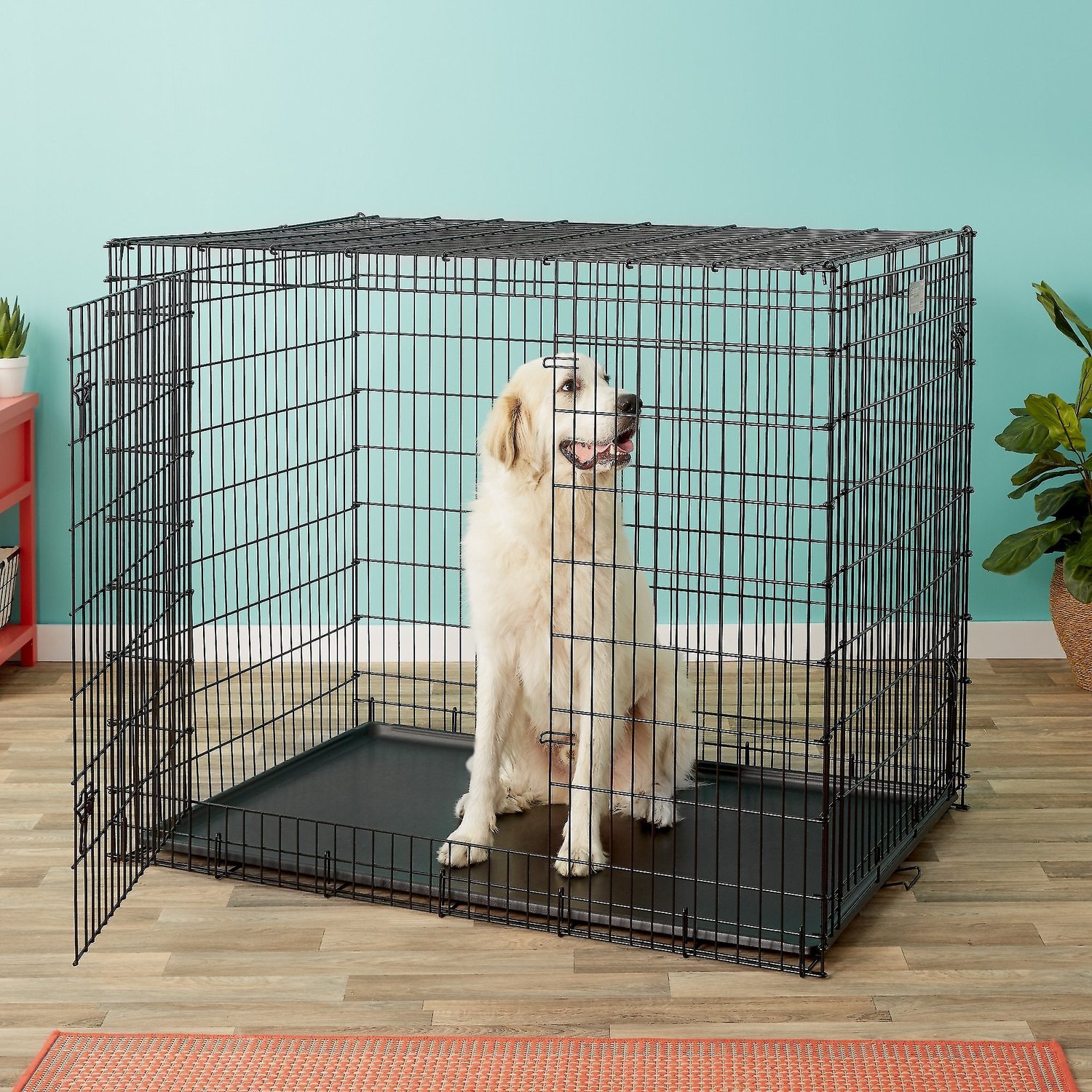
54″ L x 37″ W x 45″ H
Best Features:
- Durable, folding, very strong metal crate
- Easy to assemble w/out tools (you need two people to do it though)
- Free removable leak-proof plastic pan
- Free divider to adjust size
- 3 heavy duty locks
- 1 Year Manufacturer's Warranty
What Types Of Dog Crate Can You Buy?
Dog crates come in many different packages, and each has its own set of advantages and disadvantages.
Some crates are more portable than others because they are collapsible, while others can be used for airplane travel.
The right one for you depends on the way you want to use it, if you want a certain style to match your home, and how destructive your dog is.
Here are the 5 main types available:
- Metal Wire crates
- Plastic crates
- Soft-sided crates
- Metal heavy duty crates
- Stylish crates (wooden, rattan)
Metal Wire Dog Crate
Best match: dogs who like to see their surroundings; dogs in hot climates
These are probably the most widely-used type of dog crate. Usually, they come with a single door on the front, but some models also have doors on the side and the roof for greater access.
This type of crate is good for dogs who like to see what’s going on around them. If your dog gets anxious on seeing their surroundings while in their crate, using a crate cover can remedy this.
They’re also a great choice if you live in a hot climate, as they have good ventilation. For dogs living in colder climates, you may want a more sheltered model.
Wire crates are the most popular choice for those who want collapsible dog crates for portability. They can be a bit heavy, especially the larger-sized ones. So, if you go on lots of trips with your dog, you could consider getting a second lighter-weight crate just for travel.
They are also the best option if you want to purchase just one adult-sized crate when she’s a puppy, as you can easily adjust the space by using a divider. This makes them suitable for people on a budget who would prefer to buy just one crate that lasts from puppyhood into adulthood.
Pros of Wire Crates:
- Well-ventilated – good for hot climates or for dogs with long coats who overheat
- Good for dogs that feel comforted by seeing their surroundings
- Fairly easy to clean (most models come with a removable base tray)
- Can be fitted with removable divider panels
- Many are collapsible for easy portability and storage
- Available with 2 or 3 doors for greater access.Usually the most economical option
Cons of Wire Crates:
- Not the most attractive
- Can be noisier than other types of crates
- For more determined dogs, this type is probably the easiest to escape from
- For some dogs, the visibility can cause stress
- More exposed than other models – offers little shelter in colder climates
- While they are often collapsible for easy travel, they can also be somewhat heavy
- If a dog has an accident in a wire crate, or if they’re muddy, and then they shake, that’s not good news for the surrounding room.
>>For our review of the best Wire Dog Crates, please click here.
Plastic Dog Crates
Best match: dogs who like to curl up in privacy; jet-setting dogs

When you think of portable dog crates, plastic crates are probably what comes to mind. These crates are very light and easily transportable, so they are a good option if you go traveling a lot with your pet. Usually, the two halves can be stacked inside one another for easy storage, but they do take up more room than wire crates, as they do not collapse.
The majority of plastic crates come airline approved, so they are your best bet for air travel. If you need one for this reason, you should double check the documentation before buying.
Despite the fact that many models of plastic crates are marketed specifically as “transport” crates or “pet carriers,” but they can be used for permanent use at home, too.
They have less visibility compared to wire crates, so they are good for dogs who are easily distracted or anxious on seeing their surroundings and prefer a den-like atmosphere. They are also more sheltered, so they are a good option if you live in a cold climate.
Moreover, while they’re not indestructible, they are more difficult than wire crates to escape from. Some dog owners also prefer plastic crates as they can be easily cleaned.
Pros of Plastic Crates
- Lighter and easy for travel than wire crates
- Many are ‘airline approved’
- Less visibility – better for easily distracted dogs plus it gives a feeling of security
- The bottom half of the crate can sometimes be used as an open dog bed
- The two halves can be detached and easily stacked one inside the other
- Sheltered – offers good insulation in colder climates
- Some models have attachable food and water dishes
- More difficult than most wire crates for escape artists to get out of
- Available in different colors – can match to your home
- Some customers prefer plastic crates for easy cleaning – they can be hosed or sprayed down easily in case of accidents or just for general cleaning. Also, unlike with wire crates, if your dog is messy and she shakes, it’s not going to reach far outside the crate.
Cons of Plastic Crates
- Some dogs prefer more visibility and may find it stressful
- Reduced ventilation – not ideal for hot climates
- Plastic can hold odors over time that are difficult to get rid of
- Does not fold flat – requires more storage space than wire crates.
Take a look at this video on how to prepare your pet container for airplane travel:
Note on airplane travel with snub-nosed dogs:
It is worth noting if your dog is snub-nosed (e.g. like a pug), this can affect the size of the crate for airline travel. Due to their breathing difficulties, some airlines do not allow them to fly at all.
>>For our review of the best airline approved pet carriers, please click here.
Soft-Sided Dog Crates
Best match: dogs who take frequent little trips with their human
These look less cage-like than wire or plastic crates, so they can be a good choice for those who think the other types are unsightly.
As well as for use in the home, they are a very practical, portable option for those who love to travel with their pooches. Whether at a picnic, in the garden, or on a trip to the beach, they can provide a very nice shelter for her. Super lightweight, they can be easily carried, and, when not being used, you simply fold them flat.
While these models are available for large dogs, due to the heavier weight, they are harder to carry with your dog still inside.
They are usually machine-washable, so you can simply throw it in the wash without getting your hands dirty!
The soft material means that this isn’t the most durable of crates, so it’s better used for occasional trips rather than a permanent home. Oh, and it certainly isn’t a good choice for destructive dogs or for those who can easily work their way out!
Pros of Soft-Sided Crates
- Ideal for small, non-destructive dogs
- Extremely light and portable – perfect for camping trips, picnics, going to the park, etc.
- Easy to store – can be folded
- Soft material – more comfortable for the dog inside compared to others (though of course, you can provide bedding inside any crate)
- Most models can be washed
Cons of Soft-Sided Crates
- Not very durable
- Not suitable for destructive dogs or escape artists – they could easily tear the fabric with their claws or chew their way out
- Difficult to keep clean between washes, especially if any accidents occur
- More intelligent dogs can learn how to unzip their way out.
This video gives you a great in-depth comparison between the above 3 types of crates:
>>For our review of the best Soft Dog Crates, please click here.
Metal Heavy Duty Dog Crates
Best match: destructive doggos
For all the doggy parents dealing with destructive dogs, I sympathize with you and hereby offer you a solution! These crates are intended for the heavy chewers, diggers, and talented escape artists. Huskies, we are looking at you…
Heavy duty dog crates can be expensive, and they aren’t the most beautiful, but they are certainly worth it if your dog has these naughty habits. By buying one that can’t be destroyed, you’ll be saving yourself a lot of money and stress!
Some of these models are also approved for airline travel, so you don’t have to worry about your dog getting up to no good while you’re in the air. Plus, if she already uses this crate at home, she will be accustomed to it and more relaxed while traveling.
Pros of Heavy Duty Crates:
- Very durable – can contain most destructive or escape artist-type dogs
- Some are approved for airline travel – if your dog is already used to the crate that will make travel easier
Cons of Heavy Duty Crates:
- Expensive (but worth it compared to the cost of replacing multiple less durable crates)
- Not the most attractive – but your dog will sure look tough in front of her friends!
>>For our pick of the best heavy-duty dog crates, please click here.
Stylish Dog Crates
Best match: non-destructive, toilet-trained dogs; owners who like stylish crates
There are some very stylish crates on the market made from finished wood or rattan, so if you don’t like the idea of wire or plastic crates in your home, you don’t have to compromise. Your dog’s crate – quite literally – doesn’t have to cramp your style.
These wooden crates can actually be used as furniture! You can replace a side table, or perhaps get one you wanted anyway, and – woah! – you’ve got a place to put your mug of coffee as well as a little den for your number one companion!
They are available in a wide range of styles, so you can choose the one to suit your taste and the decor of your home.
These types of crates are not a good option for destructive hounds, as their teeth and claws will damage the wood.
Some models do come with a removable plastic tray for easy cleaning, but I still wouldn’t recommend them for house training, as any accidents will leave stains on the wood and odors may be hard to eliminate.
It’s best to buy this type of crate once your dog is fully grown, as they are expensive.
So, if you’ve got a well-behaved, house-trained pooch that’s all grown up and you’re willing to spend a bit more on a stylish dog crate, this could be the one for you!
Pros of Wooden Crates
- Some can be used as furniture
- Can more easily fit into the decor of a home
- A variety of styles available
- Some come with removable plastic trays for easy cleaning.
Cons of Wooden Crates
- Not good for destructive dogs – they can easily damage wooden crates
- If it comes with a finished wooden floor, it’s not a good choice for house training, as any accidents will leave stains and odors may be hard to get rid of
- Tend to be expensive
>>For our review of the best Stylish Dog Crates, please click here.
So Which Type of Crate Is Best?
No crate is “best,” exactly, as it totally depends on what you need it for.
I will say that wire crates give you the best value for money and they’re the most practical. This is because they can be collapsed for easy storage, they’re transportable, and you can just buy one and use dividers.
For travel – particularly on airplanes – plastic crates are the best choice, and these can also be used at home.
If you want the best of both worlds, you can always purchase a wire crate for home use and keep a plastic crate handy for your travels together.
Recommended Crates By Us!
Our Top Recommendation: – Midwest iCrate Folding Dog Crate
This is a great wire dog crate option that comes in sizes to suit all kinds of pooches, from mini to giant.
It is available in either single or double door design with slide-bolt latches to lock the door/s in place. It also includes a free divider panel, a strong carrying handle, a removable plastic pan, and rubber feet to protect your floors.
This is a collapsible dog crate that packs down to portable size, making it ideal for storage or travel.
Here’s how to assemble one of these bad boys (Yes, it really is as easy as it looks! And yes even for you, Becky):
Plastic Crate if you are going on a flight/travel
If you’re looking for a plastic crate for travel, the Petmate Sky Kennel is a great option that comes in sizes to suit all dogs.
For a plastic crate, this is a heavy duty model, made with high-strength plastic, extra strong steel wire, and a secure wing-nut and bolt design.
It has two doors for easy access – one at the front and one on the roof. As well as these two doors, there are also openings on the sides and back of the crate, which gives it four-way ventilation, keeping your dog cool and stopping her from feeling too “boxed in” as other solid plastic crates might.
This model is airline approved and comes with “Live Animal” labels, identification stickers, an absorbent pad and food and water cups. She’ll be ready to jet set with you straight away!
Conclusion
To get the right size dog crate, be sure to carefully measure your dog’s length and height as we explained. As for the style of crate, that is entirely up to you.
Wire crates are the most practical, as they can be easily assembled and collapsed, and they’re the best choice for people on a budget.
Plastic crates, on the other hand, are great for the travelers among you, and many come airline approved.
Soft-sided crates are also good for traveling with your dog. However, as they aren’t as durable and they’re not airline approved, they are better suited for short trips. I’d recommend a more durable crate for permanent use at home.
Lastly, stylish wooden crates are the least practical but the best-looking. They’re great for grownup hounds that wouldn’t dream of chewing their crate or doing their business where they sleep.


